2 New Movies Take The Oscar Biopic In A New Direction
- Oops!Something went wrong.Please try again later.
- Oops!Something went wrong.Please try again later.
- Oops!Something went wrong.Please try again later.
- Oops!Something went wrong.Please try again later.
- Oops!Something went wrong.Please try again later.
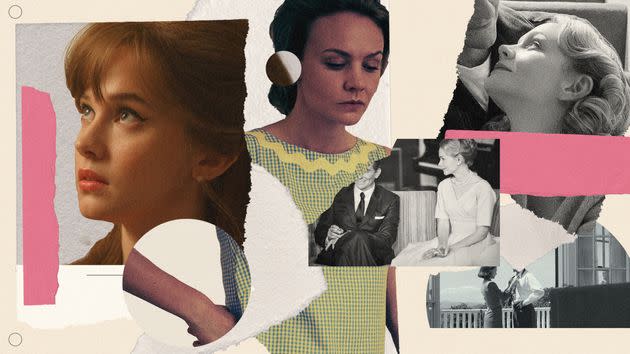
Cailee Spaeny as Priscilla Presley in Sofia Coppola's "Priscilla," and Carey Mulligan and Bradley Cooper as Felicia Montealegre and Leonard Bernstein in "Maestro."
It’s that time of year: Oscar biopic season. You know that kind of movie: the one in which a historical figure (almost always a man, and usually a white man) overcomes some obstacles to achieve something that’s now in the history books.
Admittedly, that’s a bit reductive. But many of these biopics follow such a tried and true formula that unless they deviate from traditional biopic tropes and make more specific stylistic and narrative choices, they tend to bleed together every fall.
Among the many clichés of the Oscar biopic is the role of the supportive but long-suffering wife of the male protagonist. The “great man” takes center stage. Meanwhile, his female partner is sidelined, given barely any dimensions or storylines of her own — except for a few key scenes that seem designed to win the often underutilized or undersung female actor an Oscar.
This fall, two awards season movies transform that trope, shifting the focus by exploring what it’s like to be married to a larger-than-life man. What is it like to have your world revolve around your world-famous spouse?
Sofia Coppola’s “Priscilla” follows Priscilla Presley (Cailee Spaeny) through her courtship with and marriage to Elvis Presley (Jacob Elordi), marked by his abusive and controlling behavior. And in “Maestro,” which Bradley Cooper directed, co-wrote and stars in as Leonard Bernstein, it’s Carey Mulligan who, for me, gives the film’s far more interesting and complex performance as Bernstein’s wife, Felicia Montealegre. In the process, each film complicates the more famous husband’s public image, and to some degree, punctures the fantasy of the “great man.”
From the start, “Priscilla” is not about a fairy-tale marriage. It doesn’t gloss over the uncomfortable 10-year age gap between Priscilla and Elvis or the fact that she’s just 14 when they meet at a party on a U.S. Army base in Germany in 1959. Priscilla’s stepfather is stationed there, and the already-famous Elvis is in the middle of a two-year deployment. Their dates are age-appropriate, and Elvis respects the rules and boundaries set by her mom (played by “Succession” star Dagmara Dominczyk) and stepdad. But there’s already an indication that Elvis has a specific image of what Priscilla should be like and that their relationship will be happening primarily on his terms.
“Promise me you’ll stay the way you are now,” he says to her when he moves back home after completing his military service. When Priscilla is 17, with her parents’ permission, Elvis arranges for her to live with him at Graceland as she finishes her last year of high school. Most of that time, he’s busy filming movies while she’s alone — and seeing news reports about his rumored affairs with famous co-stars.
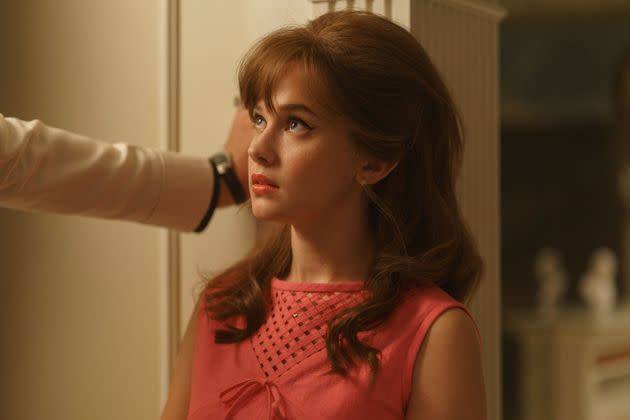
Cailee Spaeny plays Priscilla Presley in Sofia Coppola's "Priscilla."
Based on Priscilla Presley’s 1985 memoir (and executive-produced by her), the film is pretty unsparing in showing Elvis’ abusive behavior alongside his growing addiction to pills. As their relationship progresses, he starts to dictate many parts of Priscilla’s life — everything from her look and her clothes to when they should have sex. He expects her to be submissive and to be in service to him.
There are some pretty harrowing scenes that are hard to stomach. When Priscilla asks Elvis about his affairs, he shrugs them off and gaslights her. When she dares to give her opinion on some songs he’s considering, he throws a chair at her. Or when she’s extremely pregnant with their daughter Lisa Marie, he tells her he needs some time apart. The film depicts all sorts of abhorrent behavior that eventually led her to leave him in 1972.
This story and its lens seem naturally suited to a filmmaker like Coppola, who often explores the lives of girls and young women (albeit usually privileged ones) who’ve been oversimplified or misunderstood. It’s a thread that runs through much of her work, including “The Virgin Suicides,” “Marie Antoinette” and “The Bling Ring.”
The film contains all of the period detail and the sumptuous costume and production design that’s a signature part of Coppola’s films. At the same time, some of it is more muted in “Priscilla” — but in a good way, keeping with the film’s darkness and unsentimentality. “Priscilla” reminds us that there’s much more to the story than Elvis’ reign as the King of Rock ’n Roll. In the middle of it was a young woman, barely an adult, trying to find some sort of agency.
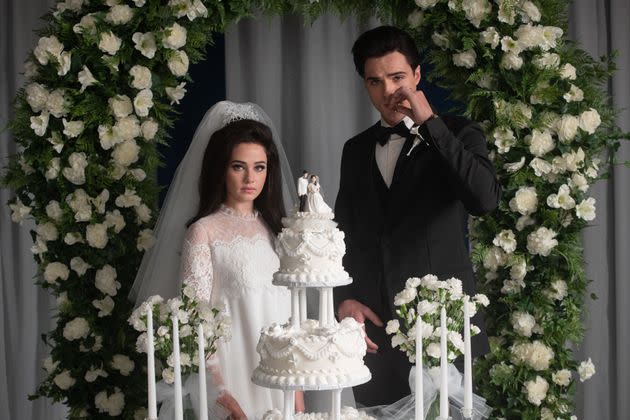
Priscilla (Cailee Spaeny) and Elvis (Jacob Elordi) in Sofia Coppola's "Priscilla," which complicates the storybook image of the couple.
Similarly, “Maestro” is clearly trying to be a different kind of movie than we’re used to seeing. Director, co-writer and star Bradley Cooper has billed it as not a traditional biopic, but a portrait of a marriage. It’s a lofty ambition, but it largely works. Like in Cooper’s “A Star Is Born,” there’s a clear artistic vision running through “Maestro,” a sense of reinventing and modernizing a familiar story.
It’s not your standard cradle-to-grave biopic or even a comprehensive look at Bernstein’s career. Cooper captures Bernstein’s magnetism and seemingly boundless energy through recreations of some of his most famous performances. The film shows the depth and breadth of Bernstein’s prolific work as the preeminent American conductor and composer of his time, and perhaps any time. It makes terrific use of his vast catalog of music, using it to creatively punctuate scenes. For instance, his “On the Waterfront” theme thunders over a young Bernstein as he’s about to conduct his very first New York Philharmonic concert in 1943.
But fairly early on, it becomes clear that this story is also about Felicia and what it was like for her to be married to someone who dominated every room he walked into and was the life of every party. Notably, the first half of the film, taking place in the early years of their relationship and marriage, is shot in black and white. The two happily host parties and do joint TV interviews, painting a picture of storybook magic. Later, the more tense years of their marriage appear in more naturalistic color, signaling a shift toward a more unvarnished truth. By then, they’re living largely separate lives, aren’t speaking much, and his affairs with younger men have become the subject of gossip.
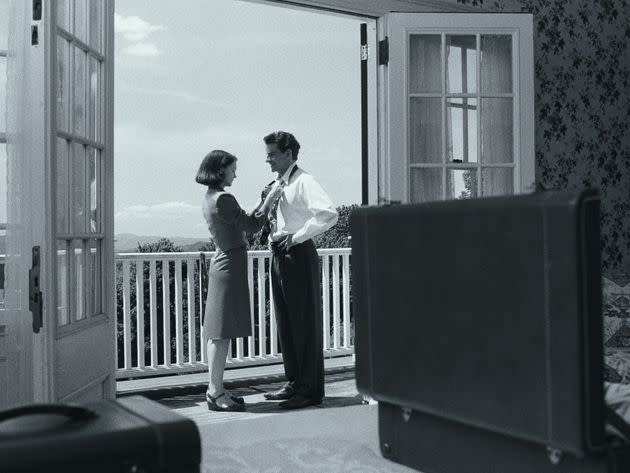
Felicia Montealegre (Carey Mulligan) and Leonard Bernstein (Bradley Cooper) in an early scene in "Maestro."
“Maestro” allows room for more complicated truths than in a standard biopic.We empathize with Leonard for having to hide his queerness and conform to a heteronormative life. We also empathize with Felicia, who, as an actor, was accomplished in her own right — but whose life, in many ways, became the supporting act to her superstar husband’s dynamic presence, as well as his infidelities and secrets.
All of this reaches a breaking point: a blowout fight one Thanksgiving morning. “There’s a saying: never sit under a bird that’s full of shit,” Felicia says to Leonard, while Macy’s Thanksgiving Day parade balloons float by their window. “For so many years, I’ve been living with this fucking bird. It’s become quite comedic!” She lobs one blistering criticism of him after another, culminating in a parting shot that’s both vicious and darkly comic for reasons specific to the scene’s setup.
However, “Maestro” sometimes seems to be at war with itself. The movie is framed as an exploration of their partnership. Mulligan gets top billing, and early posters for the movie have featured solely a shot of her with her back turned to the camera. But if it’s going to take the approach of showing her side of the marriage, why not take that even further, especially given the strength of Mulligan’s performance? (Though if we’re going to ask questions about whether it’s appropriate for Cooper to play Bernstein, it’s also worth asking questions about Mulligan’s casting, given that Montealegre was of Costa Rican heritage and grew up in Chile.) The film could have ceded more of the story to Felicia or even told it completely from her perspective. Wouldn’t that have been interesting, too?
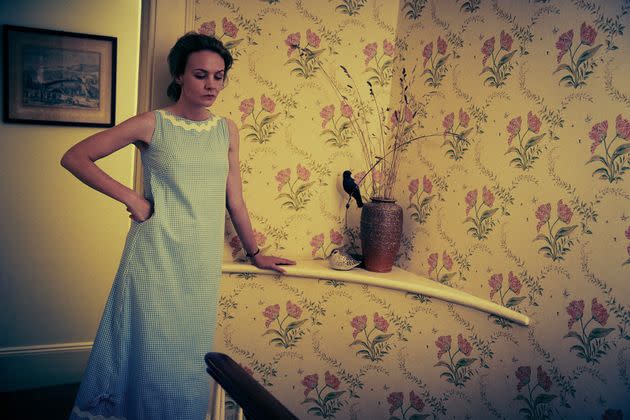
Carey Mulligan plays Felicia Montealegre in "Maestro."
“Maestro” only goes halfway there. As much as the film tries to complicate Bernstein’s image, he is still the larger-than-life figure, as he was in his marriage. After all, the movie is called “Maestro.” Its final shot also feels a bit too neat and pat: a black-and-white flashback of Felicia from early in the movie. We’re left with this sentimental memory of her rather than where the rest of the film dares to go: toward a more honest examination of a complex marriage.
But we know why the movie is called “Maestro” and why it can only take this halfway approach. The unfortunate truth is that we likely wouldn’t have either of these big-screen stories about Priscilla Presley and Felicia Montealegre if it weren’t for their marriages to their more famous husbands.
“Maestro” admirably tries to tell the stories of both Leonard and Felicia, but is still primarily about him — and perhaps, it has to be that way. And it’s telling that “Priscilla” is coming out now, only after Elvis already got the more traditional Oscar biopic treatment last year in Baz Luhrmann’s “Elvis,” starring Austin Butler. Still, “Priscilla” ends up feeling like a brief snapshot, a thin slice of her story, barely scratching the surface. Perhaps it’s a reflection of how, for centuries, it has been all too common for a woman to be a peripheral character in a man’s story.
What other stories haven’t we told? What stories need to be reexamined or unromanticized? In which stories does a person who has historically been a peripheral character in someone else’s life deserve to be the central character in their own? “Maestro” and “Priscilla” try to get us there — but there are so many more of these kinds of stories left to tell and so much more ground left to uncover.
“Priscilla” premieres in theaters Nov. 3. “Maestro” premieres in theaters Nov. 22 and on Netflix Dec. 20.
Related...
These Movies Focus On A Very Real Crisis — But They Could Do Better
New 'Maestro' Trailer Offers Glimpse Of Bradley Cooper As Leonard Bernstein
Sofia Coppola's ‘Priscilla’ Trailer Aims To Tell Priscilla Presley's Side Of The Story
Jacob Elordi’s Elvis Portrayal In 'Priscilla' Sparks Strong Reactions On Twitter
